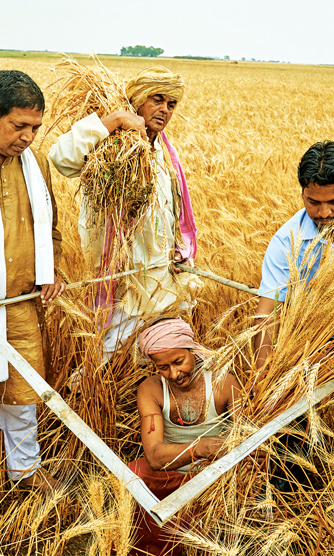and Waste Management Next Topic Environment -
Biodiversity
-
Management Approach
All ITC Units continue to pursue efficient use of raw materials through focused efforts on waste elimination/ reduction. Moreover, as most of ITC's businesses are vertically integrated, this provides the Company unique opportunities for exercising greater control over optimum utilisation of raw materials, recycling/ reuse of wastes as well as efficient logistics.
For addressing the impacts outside the boundary of operations, life cycle assessment studies of ITC's products are progressively being taken up with the objective of making such studies an integral part of product design and development. In addition, Board approved policies of ITC supplemented by a 'Code of Conduct for Vendors and Service providers' provide the direction for sustainable sourcing of raw materials to ensure their long-term availability. Please refer to "Supply Chain" section of this Report for further details.
-
ITC's Performance
ITC's products and services can be broadly classified into the following categories:
1. FMCG (B to C) Products
Cigarettes, Branded Packaged Foods, Personal Care Products, Education and Stationery products, Matches and Agarbattis.
2. INDUSTRIAL SUPPLIES AND EXPORTS
Paper, Paperboards, Packaging, Leaf Tobacco, etc.
3. SERVICES
Hoteliering and Information Technology.
Flow of materials into ITC
As explained in 'Supply Chain' section, most of the ITC businesses largely depend on agro-based raw materials. In 2015-16, ITC processed 20,52,892 tonnes of materials, out of which 95.3% (19,56,089 tonnes) were from renewable sources like agriculture and forestry.
The Paperboard and Specialty Papers Business contributes to over 80% of the total raw materials procured by ITC. 16,47,645 tonnes of materials were processed by the Paperboard and Specialty Papers Business in 2015-16, out of which 99.6% were renewable. Leaf Tobacco and Agri Business Divisions which together accounts for around 10% of total raw materials procured by ITC, processed 1,96,278 tonnes of raw materials in 2015-16 and all of these raw materials were renewable in nature. Foods Business processed 1,44,836 tonnes of raw materials (7% of ITC's total raw materials) out of which 81.3% were renewable. In the above analysis, only those raw materials have been considered which constitute more than 10% of the total, consumed in any manufacturing Unit or have significant environmental importance.
ITC's initiatives in promoting sustainable practices in its supply chain have been detailed out in "Social Investments: Mission Sunehra Kal" and "Supply Chain" sections of this Report.
-
Responsible Sourcing of Wood Fibre
Wood is a major source of fibre for the paper and paperboards industry. Availability of wood remains a critical challenge and is a serious sustainability concern, especially in a country with limited natural resources and acute income inequities.
Approximately 53% of the total fibre requirements of ITC's Paperboards and Specialty Papers Division is met by pulp manufactured at Bhadrachalam, another 19% comes from recycled fibre, processed at Kovai and Bhadrachalam and the balance 28% is imported pulp used at Bhadrachalam and Tribeni Units. Approximately 74% of the fibre manufactured in Bhadrachalam is from wood sourced from ITC's social and farm forestry initiatives. All the fibre used for operations at the Kovai unit is either recycled / reclaimed fibre. 100% of the fibre used by ITC PSPD is of known and legal origin.
High yielding, site specific, disease resistant eucalyptus and subabul clones have been developed by in-house R & D. ITC distributed 132.21 million high quality saplings to farmers which resulted in increasing the area under social and farm forestry by 32,222 hectares in 2015-16.
Apart from the obvious benefits of increasing the green cover, plantation on degraded wastelands under the social forestry program also directly contributes to in situ moisture conservation, ground water recharge and significant reduction in topsoil losses caused by wind and water erosion. In addition as a result of leaf litter from multi-species plantations and the promotion of leguminous intercrops, soils are constantly enriched.
-
Forest Stewardship Council™ Certifications
Further consolidating ITC's Triple Bottom Line performance, ITC PSPD achieved the prestigious Forest Stewardship Council™ (FSC™) Chain of Custody Certification in 2009, which is valid till 2020. To ensure responsible wood, all domestic wood procurement sources have been certified as per standards of FSC™ - Controlled Wood and nearly 30,000 hectares have been covered under the FSC™ - Forest Management Certification.
FSC™ is an independent, non-governmental, not-for-profit organization established to promote the responsible management of the world's forests and is recognized as the gold standard in wood certification for ethical and legal sourcing. The FSC™ is represented in more than 107 countries around the world and is the most widely accepted and respected certification amongst forest product certification schemes. ITC PSPD can supply FSC certified paper/paperboard from all its four manufacturing Units, i.e. Bhadrachalam, Kovai, Tribeni and Bollaram. The FSC™ logo on the product assures customers that the material is from legal, sustainable and well managed sources.
FSC™ certification for ITC PSPD illustrates the organization's continued commitment to sustainable business practices and to the building of an inclusive and secure future for its stakeholders and the society at large. The business is the largest seller of FSC™ certified grades of paperboards and paper in the country.
-
The Road Ahead
In the coming years, ITC plans to carry out more life cycle assessment studies of products/ services to evaluate the environmental impact at various life cycle stages, which would help in identifying opportunities for further improving their environmental attributes. In line with the Board approved Policies on Life Cycle Sustainability and Responsible Sourcing, formal systems and procedures will be progressively implemented across ITC Businesses.
